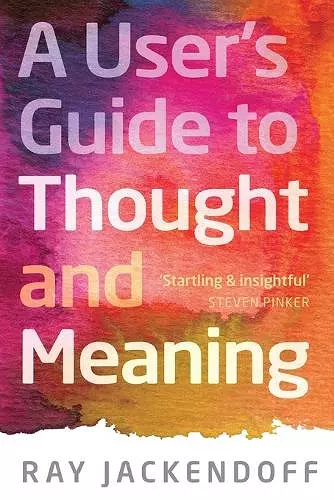A User's Guide to Thought and Meaning
Format:Paperback
Publisher:Oxford University Press
Published:2nd Apr '15
Currently unavailable, and unfortunately no date known when it will be back
This paperback is available in another edition too:
- Hardback£19.99(9780199693207)

A User's Guide to Thought and Meaning presents a profound and arresting integration of the faculties of the mind - of how we think, speak, and see the world. Ray Jackendoff starts out by looking at languages and what the meanings of words and sentences actually do. He shows that meanings are more adaptive and complicated than they're commonly given credit for, and he is led to some basic questions: How do we perceive and act in the world? How do we talk about it? And how can the collection of neurons in the brain give rise to conscious experience? As it turns out, the organization of language, thought, and perception does not look much like the way we experience things, and only a small part of what the brain does is conscious. Jackendoff concludes that thought and meaning must be almost completely unconscious. What we experience as rational conscious thought - which we prize as setting us apart from the animals - in fact rides on a foundation of unconscious intuition. Rationality amounts to intuition enhanced by language. Written with an informality that belies both the originality of its insights and the radical nature of its conclusions, A User's Guide to Thought and Meaning is the author's most important book since the groundbreaking Foundations of Language in 2002.
Ray Jackendoff is a monumental scholar in linguistics who, more than any scholar alive today, has shown how language can serve as a window into human nature. Combining theoretical depth with a love of revealing detail, Jackendoff illuminates human reason and consciousness in startling and insightful ways. * Steven Pinker *
Ray Jackendoff has an uncanny ability to ask interesting and pressing questions. Anyone interested in language and thought should ask such questions. The asking itself is the primary intellectual act - that, and of course the ordering of the asking, which is by no means obvious and constantly problematical, as he well knows and kindly informs the reader. As for providing answers, pivotal questions may have answers, but they are complex and never simple and thus require extremely careful expression. In his effort to treat his readers in a way that is warm and friendly, he sometimes employs phrases ("kind of," "sort of," "well, like," and other things relaxed speakers tend to say) which I do not find essential, but which for others will surely have the effect of making the issues clear and comprehensible. * Peter Bloom, Professor of Humanities, Smith College *
Clear and concise. The pace is perfect: very short chapters making for a very enjoyable read ... As an introduction to a cognitivist perspective on linguistic meaning and thought, this is an extremely helpful book in both tone and content. * Tadeusz Zawidzki, Notre Dame Philosophical Reviews *
ISBN: 9780198736455
Dimensions: 234mm x 179mm x 15mm
Weight: 438g
288 pages